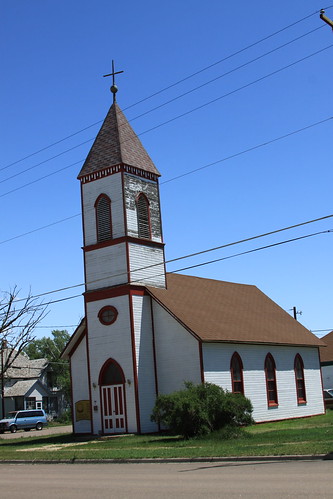Looking back, one thing about
The Laramie Project: Ten Years Later that interested me are the lengths that they went through to in order to try and reinforce that Matt's death was a hate crime. I mean, they go so far as to get a folklorist to explain why the rumor that it was a "robbery gone awry" is so popular. Personally, I've never really questioned that it was a hate crime; robbery was a major motivation (come on, they paid for a pitcher of beer with spare change, and they did in fact rob the guy), but McKinney's confession speaks for itself: he has a deep-seated fear and hatred of gay men, and the force that drove him to stave in a helpless man's skull wasn't the twenty bucks in his wallet. It was something else. Matt was kidnapped and robbed because he had a full wallet, but he was bludgeoned to death because he was gay. For me, it's basically been that simple.
But, why did TT spend so much time on this? Obviously it's a troubling trend in the community, indicative of a larger need to try and repress or forget the larger problems that Matt's death revealed. But there is something about
TLP's previous engagement with the robbery narrative that does bother me a little bit, however, and that's what I'd like go over now.
"As much as, uh, part of me didn't want the defense of them saying that it was a gay bashing or that it was gay panic, part of me is really grateful. Because I was really scared that in the trial they were going to try and say that it was a robbery, or it was about drugs. So when they used 'gay panic' as their defense, I felt, this is good, if nothing else the truth is going to be told... the truth is coming out. "
--Prof. Rebecca Hilliker, in TLP (2001): 91
"Aaron's done that thing before. They've both done it. I know one night they went to Cheyenne to go do it and they came back with probably three hundred dollars. I don't know if they ever chose like gay people as their particular targets before, but anyone that looked like they had a lot of money and that was you know, they could outnumber, or overpower, was fair game."
-- "Jen," a friend of McKinney's in TLP (2001): 61-62
Both of the quotes above from the original
TLP are probably from sometime in 1999, and I would assume before the conclusion of the McKinney trial. Both of them bring up the robbery motive. The only reason I bring this up is because
in the Newsweek article, Kaufman and TT refer to the robbery excuse as a newer development in the way people talk about the Matt Shepard murder:
"A real cause for concern, however, is the emergence in Laramie of a narrative that has gained many proponents in recent years: one that states that Shepard's murder by two local residents, Aaron McKinney and Russell Henderson, was only 'a robbery gone bad' or 'a drug-fueled murder' and not a hate crime... One hypothesis is that because Laramie was portrayed in the media as a backward town where hatred and bigotry were rampant, forcing the citizens to question their identity as an idyllic community, a "good place to raise your children."
In his post on the play on
Newsweek's website, Carl Sullivan likewise claims that "many Laramie residents seem to have concocted a revisionist version of what transpired." As he goes on to explain, "Residents could accept that Laramie might be home to drug crimes (what town isn’t?), but mindless hate? No way."
Now, forgive me for saying so in direct address, but that's garbage, Mr. Kaufman: there was no "emergence" and it's been popular for more than "recent years."
It's always been here. People have been talking about the robbery motive from the day of the arraignment and we learned about the credit card and shoes in McKinney's truck. In fact, the earliest outcry against the robbery motive I can find is Oct. 12 in the Cheyenne
Wyoming Tribune-Eagle--
the day after Matt died. Laramie residents even talked of the robbery motive to your people-- it's all over
TLP like half-smudged fingerprints on a water glass. Rebecca Hilliker didn't invent that worry out of the blue; she'd heard the rumors and responding to a real fear that robbery would be used as an excuse in court. Even one of your own interviewees, that damn limousine driver, told
Newsweek he thought it was a
"robbery gone wrong" two months after Matt's death. Those are his
exact words.
I would maintain that this is not a new development; rather, it simply has a new and more devastating purpose-- erasing the memory of an event that's too difficult to address without severe self-reflection. Robbery is the narrative we're used to telling ourselves because the GLBT population in Laramie is largely invisible and hate-driven violence in our community has largely gone unnoticed. It was therefore the narrative many of us defaulted to when the attack first happened--
before the media blitz really got underway. So I would accept TT's assessment of
why the robbery motive is so prevalent now; I cannot, however, accept that it sprung up sometime later, in response to the media blitz.
Why would this motive be so popular in Laramie so soon after the crime occurred? I don't think it was principally due to homophobia--
at first. When it first took off, it was actually part of a much larger, longstanding tension between the Laramie community members. Matt, you see, was relatively wealthy, and he was from the campus. Aaron McKinney was essentially from West Laramie, and Henderson lived out by the cement plant; they represent the working-class and poverty-line residents of Laramie. These two parts of Laramie have never really seen eye to eye, and West Laramie in particular has suffered from unfair characterization as being uneducated, crude and intolerant by some of the more so-called "open-minded" intellectuals on the campus. Pointing out that McKinney was a poor, high school dropout and intolerant and that Shepard was a gay college student just played into the same class antagonism in Laramie that had existed long before Matthew Shepard walked into town. Then, when the media waltzed in and portrayed the whole town of Laramie as closed-minded and intolerant, the robbery fable probably gained a lot of ground among others who might not have taken a side. Take a look at Shannon and Jen's interviews: that "moment" is all about this class antagonism (like calling Matt a "rich bitch") and they focus on the robbery and drugs angle too. In their minds, the robbery angle and their resentment for Matt's social class are
linked.
So, why did TT never directly engage the robbery narrative in the first play? There could be lots of reasons: maybe it never came up in interviews, or they were too busy establishing the hate crime basis of the murder, or maybe they were even uninterested. I don't think it can be #1 because, after all, Hilliker spoke of the robbery defense, and "Jen" hopped all over it, too; it's all she could talk about, practically. I can't speak to whether or not it's because "Jen" actually thinks that Matt's murder was a robbery, or if she's trying to help McKinney by playing up the robbery angle.
But for the sake of argument, let's go ahead and assume that TT had heard of the robbery argument when they were in Laramie from '98 to '99; it's the only thing that makes sense to me, seeing as it's mentioned in extant interviews and everybody was talking about it. Why not address that motive more fully? From an editorial standpoint, I think I can understand why the writing team probably didn't want to touch it. It's hard to even bring it up without somehow legitimating it as a possibility. After all, McKinney and Henderson did in fact rob Matt Shepard when they beat him. That's easy to prove; motivation and personal prejudice, however, are much more slippery matters. The play has to work very hard to make it clear that Matt's murder was a hate crime, to the point that no other reasonable possibility is even considered. After all, when you have a play built largely on personal opinion and personal reminiscence, how do you bring up a false motive in interviews without making it seem as reasonable as anything else people say? I would respond that they did the same thing with the suggestion that Matt hit on McKinney, and that was pretty well refuted by the way they layer other people's testimony in with McKinney's confession in order to discredit his claims.
Another possibility-- again, assuming they did in fact know of the robbery defense-- might be that they failed to engage the robbery motive because it fails to engage so many of the play's central questions. Robbery does not address the issues of tolerance and sexual orientation important to the play's organization; rather, it brackets them and sets them to the side. That's exactly what makes this narrative so attractive to the nay-sayers: you don't have to worry about self-examination and self-doubt anymore. It reduces Matt's murder to the simple economics of greed, and there's nothing left to discuss. Thematically, it therefore makes no sense to bring it up in the text of
The Laramie Project.
Could that be one of the reasons that TT spends so much time in the epilogue dwelling on the grisly details of Matt's murder to disprove the robbery motive is because they're fixing a previous oversight? I don't know if it's true; I just know that that's what I
want to believe, because that explanation speaks to a sincere regret I've harbored over the original
Laramie Project: I wish that they had more directly acknowledged, challenged, and dismissed the robbery motive back in 2000. When this rumor was ignored, it grew exponentially because people thought it was being suppressed. If TT had addressed the robbery motive then, it might have kept it from seeming like it sprouted out of thin air, and it would have dismissed an alternative explanation of Matt's death that really needed disproven. Would have it made a difference? Probably not. There's still that awful
20/20 program to consider; that did plenty of damage on its own.
It does raise a larger, more interesting question, however: how much should we see the epilogue as an attempt to finish or "fix" things that Tectonic Theater felt like they couldn't or didn't do in the first play? A lot of the new material-- talking to the Shepards, for one, and the killers for another-- sort of have that feeling. These are all things that they could not reasonably do in 1999, but they can now. Could the robbery motive in the Epilogue be another piece of unfinished business? I'd be interested to see what other people think.
 In the month following Shepard's death, locals and former residents attacked that article as everything from "a putdown" to "asinine." My personal favorite was the person who told them to "lose the finger paints." But none of that changes the fact that the form of that story wasn't an AP construction. It's ours. Sure, those AP hacks should be held accountable for their lazy reporting and filling in details which weren't true, but the narrative driving that portrayal is a local product. It's like slapping that little kid who points out that the emperor isn't wearing any clothes so you can keep pretending that there's no parade going on.
In the month following Shepard's death, locals and former residents attacked that article as everything from "a putdown" to "asinine." My personal favorite was the person who told them to "lose the finger paints." But none of that changes the fact that the form of that story wasn't an AP construction. It's ours. Sure, those AP hacks should be held accountable for their lazy reporting and filling in details which weren't true, but the narrative driving that portrayal is a local product. It's like slapping that little kid who points out that the emperor isn't wearing any clothes so you can keep pretending that there's no parade going on. 















